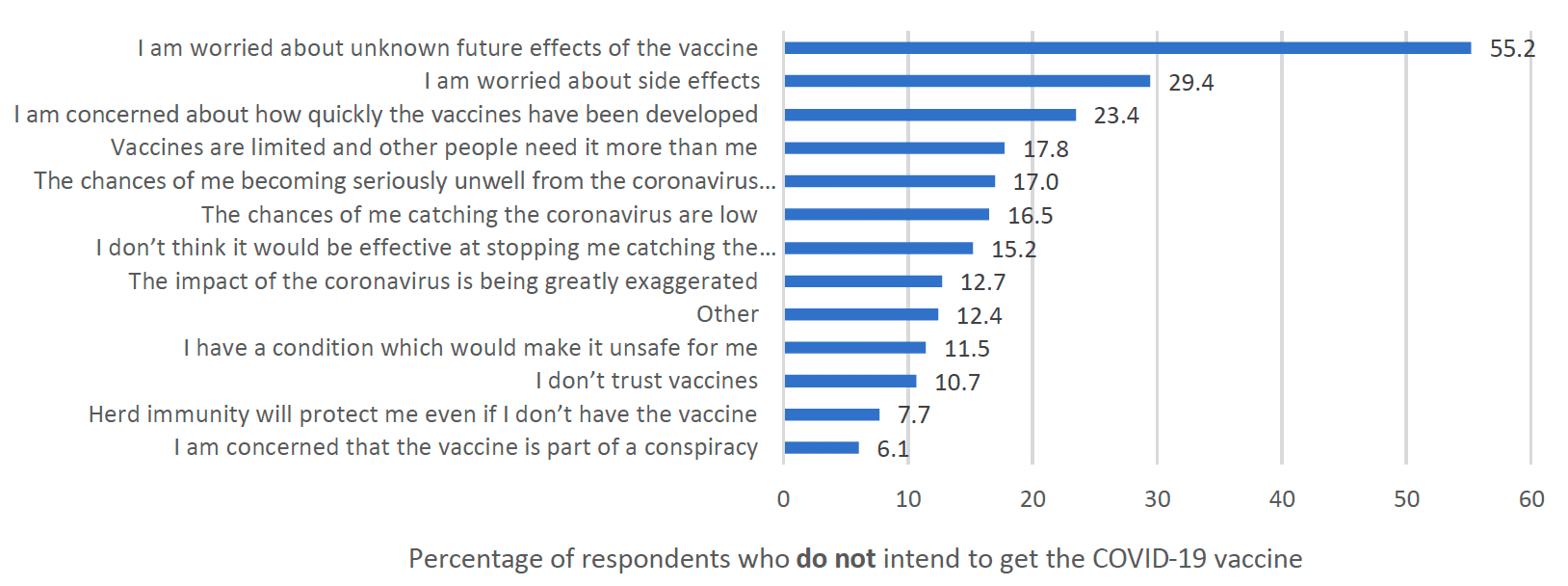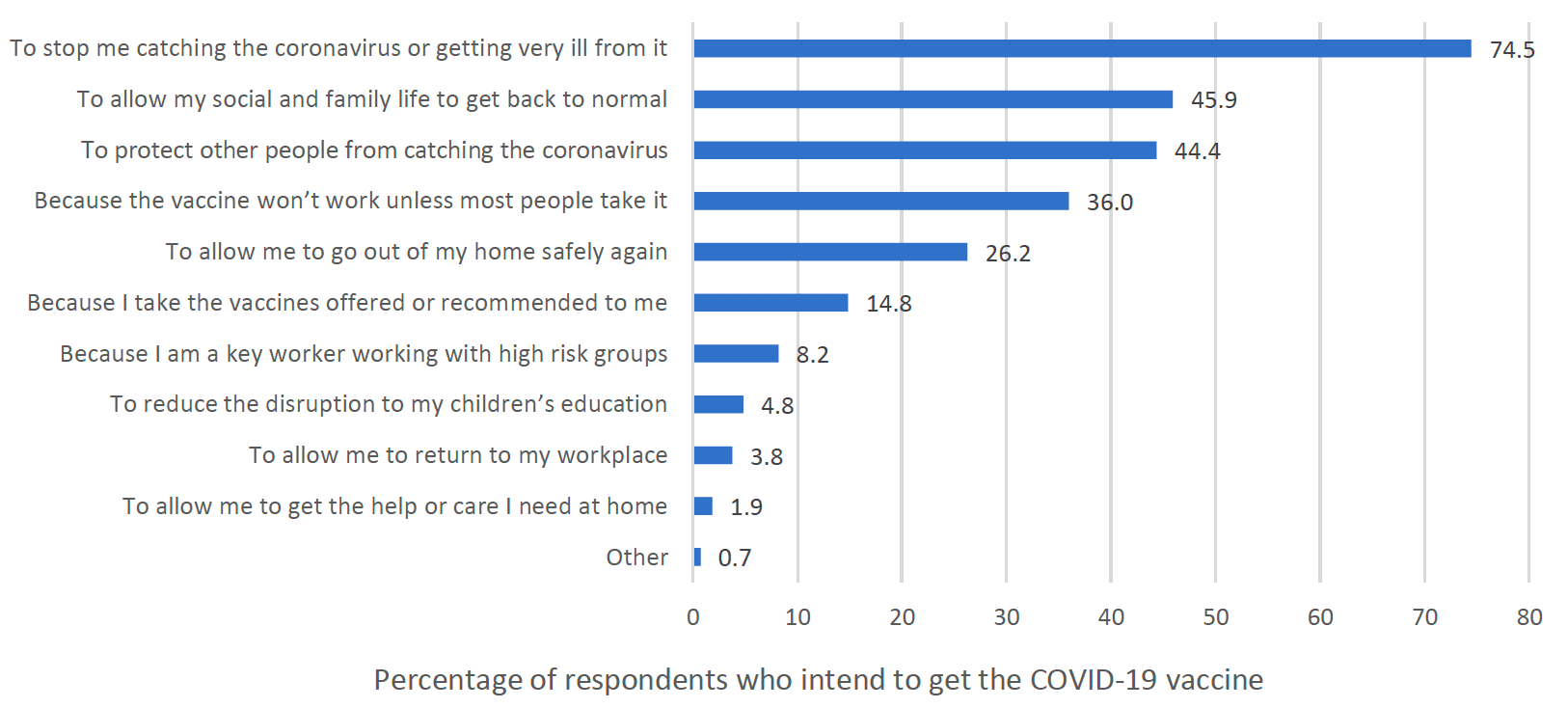Scottish COVID-19 Mental Health Tracker Study: Wave 4 Report
Wave 4 findings (data collected between 4 February and 9 March 2021.) indicate that young adults, women, people with physical and/or mental health conditions, and people in a lower socio-economic group are more likely to report experiencing poor mental health.
Annex 3: COVID-19 Contextual factors
Attitudes to COVID-19 vaccine


Effects of COVID-19
Respondents were asked: How much does Covid-19 affect your life? (On a scale from No effect at all to Severely affects my life).
- The older age group (60+ years) reported that COVID-19 affected their life less severely. The youngest age group (18-29 years) reported the highest impact of COVID-19.
- Women reported feeling that their life had been more severely affected by COVID-19 than men did.
- Respondents with a pre-existing physical health condition reported feeling that their life had been more severely affected by COVID-19 than respondents with no physical health condition.
How much does COVID-19 affect you emotionally? e.g. does it make you angry, scared, upset or depressed? (On a scale from Not at all affected emotionally to Extremely affected emotionally)
- The older age group (60+ years) were less emotionally affected compared to the younger age groups.
- Women reported higher rates of being emotionally affected than men did.
- Respondents in higher SEG reported being more emotionally affected by COVID-19 than respondents in the lower SEG.
- Respondents with a pre-existing mental health condition reported being more emotionally affected by COVID-19 than respondents with no physical health condition.
Concerns about COVID-19
Respondents were asked: How concerned are you about COVID-19? (on a scale from Not concerned at all to Extremely concerned)
- Older adults (60+ years) were most concerned about COVID-19 followed by the age group of 30-59 year olds. Young adults (18-29 year olds) were least concerned about COVID-19.
- Women were more concerned about COVID-19 than men.
- Respondents with a pre-existing mental health condition were more concerned about COVID-19 than those with no mental health condition.
- Respondents with a pre-existing physical health condition were more concerned about COVID-19 than those with no physical health condition.
Understanding of COVID-19
Respondents were asked: How well do you feel you understand COVID-19? (On a scale from Don't understand at all to Understand very clearly)
- Rates of reported understanding of COVID-19 increased with age, as older adults indicated higher scores than middle-aged adults, who, in turn, scored higher than younger adults.
- Women reported higher rates of feeling they understood COVID-19 than men did.
- Respondents in the higher SEG reported higher levels of understanding COVID-19 than respondents from the lower SEG.
- Respondents without a pre-existing mental health condition reported higher levels of understanding COVID-19 than respondents with a pre-existing mental health condition.
- Respondents with a pre-existing physical health condition reported higher levels of understanding COVID-19 than those with no physical health condition.
Control over COVID-19
Respondents were asked: How much control do you feel we have over COVID-19? (On a scale from Absolutely no control to Extreme amount of control)
- The 60+ age group reported feeling higher levels of control over COVID-19 than either of the younger age groups.
- More respondents with a pre-existing mental health condition reported feeling that they had lower control over COVID-19 than did those with no pre-existing mental health condition.
- Respondents with a pre-existing physical health condition reported feeling that they had higher control over COVID-19 than did those with no pre-existing physical health condition.
Willingness to contact GP for a non-COVID-19 related health concern
Respondents were asked:
How willing would you be to contact your GP about a non-COVID-19 related health concern e.g. a new or changing symptom, if you felt you needed to right now? (On a scale from Not willing at all to Extremely willing)
- The following groups were less likely to contact their GP about a non-COVID-19 related symptom than the sample average:
- Adults aged 18-29 years and 30-59 years;
- Respondents from the lower SEG;
- Female respondents;
- Respondents with a pre-existing mental health condition.
Contact
Email: socialresearch@gov.scot
There is a problem
Thanks for your feedback